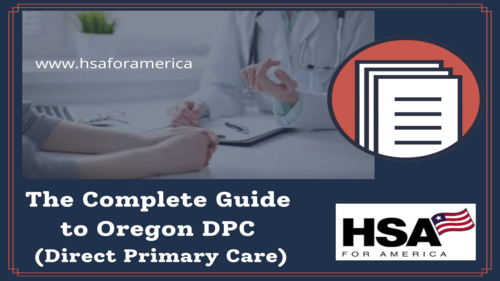If you’re looking for a better healthcare option in Oregon, you might look into Direct Primary Care. The Oregon DPC model offers low-cost, flexible healthcare for routine services.

What Is Direct Primary Care?
Direct Primary Care, or DPC, is a flexible, low-cost option for consumers who are looking for an alternative to traditional health care. It is a membership-based healthcare model that provides coverage for routine and preventive care—which is what most people use their insurance for on a day-to-day basis.
Direct Primary Care members pay a low monthly fee as opposed to the high premiums, co-pays, and yearly deductibles that come with regular insurance plans. Oregon DPC providers usually see fewer people overall, so they can provide more tailored, attentive service to their patients.
DPC providers give access to all the same routine services and preventive care as those who work with traditional insurance carriers. DPC is not health insurance, though, so if you want to still obtain coverage for things like unexpected accidents, surgery, or hospital stays, you’ll need to opt for an additional plan, such as a healthshare.
Since DPC providers aren’t overburdened with too many patients and the bureaucratic requirements of a traditional healthcare provider, they are freed up to offer more services to their consumers , such as health and wellness classes, yoga sessions, and nutrition counseling.
You can learn more at: dpcare.org
How Do I Find an Oregon DPC Provider?
To receive Oregon DPC services, the first thing you’ll do is choose a Direct Primary Care physician that provides for your area. You’ll sign up for a membership with them for a flat-rate monthly fee. Typically, this is between $75 and $110.
With this membership, you have full access to as much primary, preventive, and (sometimes) chronic care service as you need. No matter what comes up, if those services are provided by your DPC-chosen physician, you’ll be able to receive them without paying anything extra.
Usually, your DPC provider will have you sign a Direct Primary Care patient agreement, which states what they will provide you and what is expected from you as the patient. It will cover the membership fees, who is covered under your plan (you as the individual or your whole family), and what happens in the event of nonpayment. It will also state the legal practices of the facility, such as privacy statements.
This patient agreement will also detail what services your provider does not cover and the fact that your membership fee is not to be considered comprehensive health insurance. Many DPC facilities also offer choices for membership, so you can choose the budget-friendly option that works best for you.
Remember that a DPC membership won’t cover prescriptions, hospitalizations, or most specialty care, so you’ll then need to choose an additional health plan. However, there are plenty of budget-friendly options, such as healthsharing, accident insurance, or a high-deductible health insurance plan with a lower premium.
Why Aren’t There More Oregon DPC Clinics?
Because of the improved model in DPC healthcare, Oregon DPC providers usually report that they have greater job satisfaction, deeper relationships with their patients, and better outcomes from their health reporting. However, the move from accepting traditional insurance to Direct Primary Care is one that some providers have yet to take. The number of DPCs in Oregon is small now, but will continue to climb as people take advantage of this option and request more DPC providers.
The last two years have seen a revolution in healthcare availability and the demand for choice, so the Direct Primary Care model is at the perfect stage to become a critical piece of the modern-day, financially conscious healthcare puzzle.
What Kind of Health Insurance Do DPCs Take?
DPC providers don’t accept health insurance; instead, members pay a monthly fee and then have unlimited access to that provider’s covered services.
This option is almost always more affordable than traditional insurance plans. However, since life sometimes brings additional medical costs such as surgeries, accidents, or extended hospital stays (as well as non-covered services), we encourage all consumers to take out another option for coverage, such as a healthshare plan. You could also contribute to a health savings account, and your employer might have resources for you to invest those deposits for future financial success.
On the insurance note: If you’re opting to take out additional coverage with an insurance plan, you cannot use DPC membership costs toward your deductible. You also can’t use your health savings account to pay for direct primary care, but you can keep an HSA and contribute to it to pay for other non-DPC services.
Why Healthshares Are So Popular with DPC Members
Healthsharing organizations are so popular with DPC members because DPC membership doesn’t cover surgery, hospitalizations, lab tests, or most specialist visits. That being said, the low monthly cost of a DPC membership as well as a healthshare membership is still often cheaper than a health insurance plan—and that’s not counting the additional co-pays and deductibles that you won’t have to pay.
Healthshares, such as DPC Direct, give members peace of mind when it comes to healthcare coverage. The DPC Direct plan is specifically designed to work for DPC members. Since you’ve already paid your DPC membership to cover preventive and routine care, the majority of healthcare costs are already taken care of which makes the DPC Direct plan very affordable.
Many healthshare plans also offer 24/7 video and telehealth conferencing and other benefits (such as discounts on dental, vision, and hearing care) to further reduce your healthcare costs.
Compare Pricing on the Best HealthShare Plans Available
Oregon DPC FAQs
Healthcare can be confusing! Our Personal Benefits Planners are here to help you navigate through the information with a quick phone call or appointment. If you’d like to get the gist though, here are some frequently asked questions that will give you the main ideas.
How much does an Oregon DPC membership cost?
It depends on the chosen DPC provider, but the membership fee for DPC services is typically around $100–sometimes a bit more, sometimes a bit less. Your DPC physician won’t ever send you an unexpected bill for something that they don’t cover.
When might a DPC membership and healthshare plan not be right for me?
If you have a serious health condition or medical needs that might require intensive attention for many years, then you might get better value from a traditional health insurance plan. Speak to one of our Personal Benefits Planners for help deciding.
What does DPC pay for vs. what a healthshare pays for?
A DPC membership will cover your routine and preventive care visits with your primary care provider. A healthshare plan shares other medical costs using monthly membership fees from the pooled resources of all members.
How long does it take to get an appointment with my DPC provider?
Usually, you can get same-day or next-day appointments with plenty of availability. Since providers aren’t overwhelmed with all patients in the area that take certain insurance, they can accept the number of patients in their practice that they are comfortable serving without crowding or burnout.
Why do Oregon DPC providers report higher job satisfaction?
You deserve to see someone who loves what they do. Since Oregon DPC physicians aren’t burdened with insurance paperwork or red tape, they can spend longer seeing patients and developing relationships. This makes for happier doctors.
Are there extra fees that I need to know about?
Each DPC practice has a different list of covered services. These will be outlined in your patient membership agreement. You’ll always be able to look and see what services your DPC provider covers and they will let you know upfront what needs to be paid out somewhere else (such as labs). Your physician won’t normally charge you for treatments that they provide in their office.
What do I do about prescriptions and medications?
If you know you’ll need ongoing prescriptions or want to have coverage for ones that might come up, you can choose an additional standalone drug plan or use a prescription discount plan.
Conclusion
If you need more information or would like additional DPC resources, just schedule a chat with one of our Personal Benefits Managers. They have extensive experience and will be happy to help you find the healthcare plan that is right for you.
Where Can I Find A DPC Practice?
Use the map below to find a DPC practice in your area. Note that some may not be accepting new patients at this time.
The drop pins that are Blue are DPC offices with whom we have a personal relationship, and that are currently accepting new patients. You can also see past issues of our DPC Newsletter that we mail out to our DPC Partners. (Attention doctors and patients: if you do not see your DPC clinic on the map, please click here to add your clinic.)



